George Bunnell Show Notes
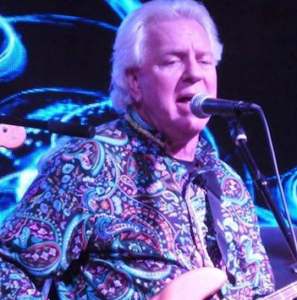 Talking Points
Talking Points
Band history and foundation of Strawberry Alarm Clock
How they arrived at the name.
Oingo Boingo connection
Venice Beach
Writers of Incense and Peppermints getting “jacked”
Bad practices in the music businesses by music biz types.
More personnel swaps and other Alarm Clock stories
Similarity to the Doors. Ray Manzarek and Robbie Krieger.
Comparisons with other bands.
Other songs – Curse of the Witches and World on Fire
The Unjust Drug Bust
Ontario Motor Speedway gig with Ben Balloon
Other names that came up: Frankie Avalon,Connie Stevens, John Walmsley, Richard Marx and Madonna.
Remaking Incense and Peppermints, Licensing woes
Roger Ebert, Valley o9f the Dolls
Playing unplugged
Links to Strawberry Alarm Clock Website, Videos and Other Resources
Links to Strawberry Alarm Clock Website, Videos and Resources
Strawberry Alarm Clock – Official Band Website
Videos
Incense And Pepperments
Wake Up Where You Are – Full Album
STRAWBERRY ALARM CLOCK PERSONNEL
Current Lineup
George Bunnell – bass, rhythm guitars, vocals
Steve Bartek – guitars, flute, producer
Gene Gunnels – drums, percussion, vocals
Randy Seol – drums, vibes, percussion, vocals
Mark Weitz – keyboard, vocals
Howie Anderson – lead guitar, vocals
Previous Members
Chris Jay
Randy Zacuto
Lee Freeman – rhythm guitars, harmonica, vocals
Ed King – lead guitars, bass, vocals
John DeLeone – drums, percussion
Gary Lovetro – bass
Greg Munford – vocals, drums )
Marty Katin – drums
Jimmy Pitman – guitars, vocals
Paul Marshall – guitars, vocals
Leo Gaffney – vocals
Doug Freeman – vocals
Peter Wasner – keyboards
James Harrah – guitars
Clay Bernard – keyboards
Bob Caloca – vocals
Bruce Hubbard – drums, percussion
Jon Walmsley – guitars, keyboards, vocals
Glenn Brigman – keyboards
GEORGE BUNELL FULL TRANSCRIPT
Hal InPhilly 0:00
Now I gotta be honest with you, I remember Incense and Peppermints
George 0:09
Ehh, yeah!
Hal InPhilly 0:11
And, admittedly, you know, who was it? Tom Rush? Somebody said, “If you remember the 60s, he weren’t there.”
George 0:18
Ahh, yeah.
Hal InPhilly 0:20
And I kind of fall into that trap. I was drinking a lot with my friends… or doing acid. You know, I tried all the stuff… back in the day
George 0:29
Yeah.
Hal InPhilly 0:30
And I didn’t really get a real good gauge about what The Strawberry Alarm clock was all about back then. But in retrospect, I’m looking at the whole psychedelic scene and the music business was changing, and then it went from like the British Invasion and then Bubblegum came in and then you came out just when groups like the Lemon Piper’s and other groups, but when I listen to your songs, you don’t sound Bubblegum at all. But back when… no… What’s going on?
George 1:00
I got lumped into that.
Hal InPhilly 1:03
Right, and you guys are like pure die-hard. good musicians. Your vocals are as good as Beach Boys are Crosby, Stills and Nash. I mean, you worked out some pretty, pretty tight harmonies.
George 1:15
Yep! They’re intricate
Hal InPhilly 1:20
Yeah, I noticed because I was checking some of the stuff out. I’m like, Damn, I missed out on this on this whole episode here. So take me back. I know I missed a little bit of what you’ve been going through growing up. So, you got to kind of bring me up to speed. If you got a good story or to just lay it on me.
George 1:40
The way it all started is there was two different bands. I was in a band with Randy Seol, the drummer and Steve Bartok, who put flute on the first album and he was also a guitar player. And there were three other guys in our band. Criss Jay was the lead singer and Randy Zacuto, the lead guitar player and Fred Schwartz, was the keyboard player. And we had a bunch of songs mainly. Steve Bartek and I were writing the songs and Fred Schwarts and Randy Zacuto, were writing songs together too.
George 2:18
And a lot of those songs Randy Seol ended up going an getting an audition with the Strawbaerry Alarm Clock but they won’t call it the Strawbaerry Alarm Clock. They were called Thee Sixpence and they were you know the other half of what ended up being Strawberry Alarm Clock which is Mark Weitz on keyboards and Ed King on guitar and Lee Freeman on lead vocals. And at the time, their drummer was Gene Gunnels And what ended up happening was Gene’s girlfriend gave him an ultimatum because nothing was going on with their band, and they were all kind of like already out of school. Either drop out or whatever, you know. Mark had already graduated. And he had already gone to Valley State College and so he was on his way. He was ahead of the rest of us. He was 21, the rest of us were 18. And anyway, I went when Gene his, after his girlfriend gave him the ultimatum, he decided to go with the girlfriend and quit the band right after he played drums on the track, for Incense, and Peppermints so it’s him on the recording.
George 3:35
So, the manager got wind of Randy Seol, our drummer, who was also a singer, and Randy Seol had come up from Riverside, and he had like kind of a… he was known because of the music circuit. Y’know, he – all the musicians like, that’s how we got him, you know, through our local music store here. Anyway, he put himself out there, to audition for all kinds of groups, he even auditioned for The Seeds, and The Electric Crows, and you know, other bands. And he was in this other band called Factory that was a great band, but they never made it. Kind of like the band the Cyrkle that turn down anything. And
Hal InPhilly 4:20
You say, The Cyrkle? “C-y”… the ones that did Red Rubber Ball?
George 4:23
Red Rubber Ball? That’s what it was! Yeah! Yeah, they were kind of like that. But anyway, so Randy ended up getting the gig with the with, they were called Thee Sixpence. And, started to do some shows with them, and it came out Incense, and Peppermints. I finished up the recording and released the record. And they have in a third like you were saying Birdman of Alcatrash was on the flip side and it was a novelty song that Mark had written with Leon, that day. But, but I don’t think Lee got credit but I think the two of them came up with it. And, and that’s what the band had intended. to keep them. For the six months they intended for Birdman of Alcatrash because as a novelty song, you know, like, One-Eyed Purple People Eater or something different.
Hal InPhilly 5:25
Right, right.
George 5:27
So they were trying to do one of those kind of things. Because before that they had released a bunch of single, but they were all you know, went by the wayside. A couple of them have original songs on it. And but they could get any of it signed. The DJ in Santa Barbara, who was a friend of the band’s manager, was named Bill Hall. And ultimately, he ended up ripping the band off, and he, at the time was a go getter. And he’d go knock on doors and get everything done. And he knew this disc jockey in Santa Barbara named Johnny Fairchild and Johnny Fairchild said, “Well i think the A side is actually “Incense, and Peppermints”, not Birdman of Alcatraz.You guys are crazy…
George 6:17
So he started playing Incense and Peppermints instead of Birdman of Alcatraz. Well first if all – He was a disc jockey. He can make or break a record pretty much just by how often they play it or what they say when they’re playing it, you know?
Hal InPhilly 6:31
Right
George 6:33
He got the the build up going and made it the # 1 most requested song in their league, which is what they used to do in those days.
George 6:44
Right
George 6:45
People used to call in and request the songs to be played. So that happened all over the country actually, but, Incense, and Peppermints started on one station and he was in Santa Barba ra it was called KIS, And Jonny Fairchild was the disc jockey. Really nice guy. Anyway, he loved the band and the band had been playing in Santa Barbara at this place called Dino’s pizzeria. And I used to go up there with Randy Sudokus, Randy’s he was the drummer in my band still. And so I used to run us and we were best friends like it. So Randy used to bring me up there to do watch their gig and watch them play. They decided that they wanted to record a bunch of the songs that my band had, that Steve Bartek and I wrote and Fred Schwartz, the keyboard player, he wrote the song The World’s on Fire, but he wrote the music and it was called “Colors On the Wall”. So we went in the studio, I brought, first of all, I brought the keyboard tech and I brought all the songs over to a band rehearsal of Thee Sixpence but by that time, they were changing their name to the Strawberry Alarm Clock because they were on the verge of getting a record deal from the record company. So there’s other bands called The Sixpence… you got to get rid of that. Okay? So they sat around trying to come up with a name and they managed to come up with strawberry alarm clock. There, there’s a story, but it’s not that great. But the story is they were sitting around. Mark, keyboard player wanted us to be Strawberry, because of Strawberry Fields Forever, right?
George 8:27
He’s not that psychedelic.
George 8:31
He was into everybody at the time was like into the psychedelics in the in Canada. They were sitting around in Mark’s bedroom… was the rehearsal room. It was a guest house at his parents house. sitting around in there and Mark has his little Big Ben alarm clock, and it tended to make a wacky sound like it was scraping the hands were scraping going around at a certain point. And everybody, after throwing out a bunch of names with Strawberry, the alarm clock made its own little presence known, and we all kind of looked at it! Strawberry Alarm Clock! So that’s how the name came back.
Hal InPhilly 9:15
So anyway, so in retrospect, then you could it could have had a cuckoo clock it could have changed the name of the band. Strawberry Cuckoo.
George 9:24
. Yeah, well, they were coming up with all the other things like “Strawberry Toilet”. Y’know. Everything they could think of. Yeah, a little alarm clock went off and that was that.
Anyway, so that was the name of the band. So Bartek and I went to that house, that little guest house and played him all of our songs and they said, you know Ed King was kind of the decision maker in the band him and Mark Weitz.
So they decided to do all our songs and they were getting this recording deal. They got the single deal. And, and then they said, like we were learning the songs. I was teaching them the songs and Steve was playing flute and I was playing guitar and then their bass player wasn’t grasping the whole idea of the bass parts and I had a couple of the bass parts are written with the song or so. I am Why don’t you just play bass partner? So then we go in the studio. So I started playing bass on a bunch of the songs… Ed K ing he played bass on a couple of tracks, too
Once we finished the all the recording the band said why don’t you be in the band?
George 11:35
So Randy the drummer goes, so, we’re gonna have to quit. He goes, “Just quit. We got a record deal” And I’m like, “Okay”, and then my band.. the other guys were kind of pissed off. Steve Bartek, he was in the other band too. But he is., “No, you cannot join the strawberry alarm clock” Because he was 15. The rest of us were 18
Hal InPhilly:
Who was 15? Bartek?
George:
He was. His mom said no. And yeah, and so he was bummed out. But anyway, he stayed home and his story turned out really well because he stayed back while the band went on to success, although he wrote, you know, all the songs. He says he did get some, some paychecks from it, and it did really well, but he was staying home. And he ended up finishing his schooling and going to UCLA and getting particularly music and everything. And then after, you know, a few years later, he ended up in the band, Oingo Boingo, which I don’t know if you guys know East Coast,
Hal InPhilly 12:48
Oh, I used to live in California. Just actually I knew Danny and Rick, his brother, they worked. Oh, they both worked at the Great American for a short time. And then I also used to see the Oingo Boingo out on Venice Beach a lot. They used to just play acoustically doing their schtick.
George 13:05
Yeah. Exactly. Okay. So you totally know. So Steve ended up in that band. And now he’s Danny Elfman orchestrator for all the movie scores Danny does.
Hal InPhilly 13:17
Right.
George 13:17
And Steve was the producer and lead guitar player of Oingo Boingo for their entire career. Yeah,
Hal InPhilly 13:23
I think of myself as a sort of like Zelig or Forrest Gump. Like I’ve been like in every scene in the background like a fly on the wall. I don’t know how I managed to do it, but I’ve always just been where things were happening.. So…
George 13:42
that’s pretty good. Yeah.
Hal InPhilly 13:50
And and what’s the guy that on the rollerskates that was out there all the time. Henry Carry Harry.
George 13:58
Oh, yeah. The guy that plays Hendrix
Hal InPhilly 14:03
So yeah, I saw all that stuff. And who knows? I might have met you for all I know somewhere along the line.
George 14:17
So I ended up I did end up quitting my band and and went and joined the Alarm Clock, and then Incense and Peppermints started to take off and… First I was with them going to Johnny Fairchild’s studio, and then all of a sudden, Palm Springs happened and eventually LA, picked up the song and it and then it, there was this guy, Bill Drake, who owned all the stations across the United States that were CBS stations and he He said, I’m going to go with it. So he put it on like 250 stations one day. And you know, that’s all you need is the boom and the thing just have a life of its own and it took off and it was a massive hit. And in the meantime, there’s a nother side story there because two things happened. One was during the recording of the song… see the lyrics were actually written to Incense and Peppermints by John Carter. But he had nothing to do with the band. He was just the the band’s producer’s, lyricist that he worked because the band The producer Frank Slay had a publishing company. And so John Carter was one of his go to writers. And Incense and Peppermints like when Gene Gunnels played drums on it, it was an instrumental and the actual tracks that you hear on the video was originally without vocals. And so, it was written by Mark Weitz and Ed King.
George 16:23
And what ended up happening was they got jacked on it because of the manager wanted everybody’s name on it including his own. And so the producer said no, it’s not gonna happen that way. Narrow it down to two names and, you know – and it’s going to have John Carter and Tim Gilbert as the lyricist. And Tim Gilbert though, really didn’t do anything I don’t think, and it was mainly John Carter’s lyric.
George 16:55
And so, what ended up happening was they sent the thing into copyright without Mark and Ed’s name on it. So they got nothing of the song. They wrote the music, and the things the whole track was already recorded and done. So not only did they write the music, it was already in the can, and they got nothing. So it’s like one of those really strange cases, of Mark and Ed were told basically just to shut up if you want to make it in the music business . It’s kind of what you have to do, y’know.
Hal InPhilly 17:27
That wasn’t uncommon. And there was a couple books, Hitman and Platinum Rainbow. Both contributed to my – I stopped writing or trying to write songs for two years, because after reading these books and reading all like stories like that.. A&R guy wanted to put his name on every record that that he didn’t write, you know, I’ve said, if that’s the way it is, and like, I don’t want to do this.
George 17:52
Yeah, it was bad in those days. It’s probably not much better now. But I think, yeah, we’ll
Hal InPhilly 17:58
See the thing is, now, you have your video go viral, and everybody knows who did what now.
George 18:05
Yeah. Also now though, they don’t have a limit as to how many names they’ll put on a song. Right now, you’ll see like, like, when I vote for the Grammys, I sit here doing my voting, and I look at the list of songwriters and some of the songs. I’m like, WHAAAAT??? like eight or ten names you know, it took an army to write the song and it’s some some of the songs are like nothing. You know?
Hal InPhilly 18:30
What? Each person wrote A WORD.
George 18:33
Yeah.
Hal InPhilly 18:34
So let me just ask you this. Before Incense and Peppermint.
George 18:40
Can you remember how it felt like the very first time you heard it on the radio like, what’s that feel like?
George 18:45
It was pretty remarkable. I was on a date with some girl and I was on a double date with our drummer Randy and these two girls were sisters and it came on the radio We were like, whoa. And they were like we were blown away, but they were even more blown away. The date didn’t hurt.
George 19:13
Anyway, there was one little extra little tidbit on Incense and Peppermints. So, after John Carter came back to the band with the lyrics he wrote, they tried everybody’s voice in the band to see whose voice would fit. And, and it was, the song was since it was already recorded, it was in he and the key wasn’t right for any of the singers and the alarm clock. And there was another friend of the band, great Munford just hanging out in the studio because the manager also produced him and managed him. And they said, they let him try out. He said, go ahead and and give it a whirl. It was exactly it was in his perfect key. It was right in his wheelhouse. So they figured, okay, it’s just a demo. And he wasn’t in the band. And so they kept the track with him singing it. And then it created a whole problem from there because he didn’t, because the band, the song started to make it. And he didn’t want to be in the band. He was his own artist, you know. And he wanted to have a solo career. So it wasn’t he was never going to join the band. That was that’s another little side story. So the lead singer on intensive was normally in the dance. And he did this on like, in one take anyway. Three minutes or something that the song was is how long he was.
Hal InPhilly 20:37
Ahh, see now I never I some reason I just assumed that was you singing lead? What’s it What’s this? No.
George 20:45
Greg Munford
Hal InPhilly 20:46
Greg Mumford.
George 20:48
Yeah. And his solo career never ever did take off. He had singles and stuff…or… tried to, and he’s kind of like an underground thing that people know who he is. But he never had any kind of great success. It would have made the band a whole different thing. He would have stayed in our band. Sure. But anyway, Cei la vie. And so yeah, that was that’s the story of Incense and Peppermints and how the whole thing started. That’s pretty much it in a nutshell. And, and I was in at that point and rode the whole success train, you know, with the band and did all the TV shows and everything, but I didn’t play on the original record. As a matter of fact, it’s only Ed and Mark and Gene, the drummer, and Gene wasn’t in the band anymore. And so and then they had Randy Seol. Yeah.
Hal InPhilly 21:41
So you went to quite a few personnel changes it sounds like
George 21:44
Only before everything started, kind of, it’s like, they brought me in as a songwriter, because they already had a bass player guitar teacher was was the bass player and but they said we want you in the band, and then you can play guitar and whatever else you want. Do percussion and, and sometimes play bass. And I said, Okay, fine, cuz they had a record deal. So it was like cool. And that’s what happened I was in it and then they decided that they didn’t want Gary in the band anymore. So after the first album, they fired and by that time the band was a real entity and under contract. And so he sued for breach of contract, which I ended up getting caught up in, there’s their lawsuit too. So and Randy field became the drummer and he was the cute guy in the band. And so the manager wanted him to be the lead singer and lip sync Incense and Peppermints on all the TV show. Instead of have the lead in because we had the, you know, Lee Freeman was the lead singer in the band, but Randy had all the songs of mine.
Hal InPhilly 22:54
Yeah, he wanted the cute guy. I can see that.
Hal InPhilly 22:57
Yeah.
George 23:00
Neither one of them’s sang the song. And both of them could sing it. It’s just that they wanted Randy to be the guy. And at that point, Randy was singing all these other songs that I had brought to the band. So he was essentially becoming the lead singer. And Lee was just being the rhythm guitar player and singer too, but and not until the second album did Lee start to sing lead on a bunch of things. But the second single came out too soon. The song “Tomorrow” was written by Mark Weitz and Ed King and just like incense and peppermints was that they got no credit on inset. So the manager felt bad for what caused it. So before the second album was even recorded, he had the band go in and record a song that mark and Ed wrote, called tomorrow and release it as a single. And it wasn’t on the first album and the second album wasn’t going to come out for three more months or four months. And so the really blew it there. And but the song rode on the coattails of intense peppermints and got to number 23 on Billboard, which is like a hit record, you know, and, but it could have thought it could have gone higher if everything was perfect. I also thought that they should have bought more of the songs from the first album to be singles after Incense and Peppermints but they didn’t. The first album was number 11.
Hal InPhilly 24:27
So essentially, they sort of like relegated you to being sort of like one hit wonders when you probably could have had several more hits after that.
George 24:36
Yeah, yeah. And it was we were never really a one hit wonder cuz it you know, the album was number 11. The single was number one, and then the follow up single was number 23. Right. So there’s like three hits right there. In a row. But the second album, didn’t chart. It didn’t even hit the charts. Because this the way that they screw the whole thing up. That was the manager and He was an idiot. Now is he was the guy that was responsible for making it all happen and then he blew it all he
Hal InPhilly 25:08
is he still around or…?
George 25:10
I think he passed away last year. That was the rumor. We lost touch with him but then somebody said, you know, he had this. He started a record company called Akarma. And it was out of Italy. It should have been Bad Akarma.
Hal InPhilly 25:25
Or just Bad Karma. B-karma. The B is for Bad?
George 25:28
Yeah, B-Karma. And so but, yeah, so anyway, he any – And he continued ripping people off off all the time. And he ended up releasing all of the Sixpense singles on A Karma.
George 25:30
You were saying that they brought you in as a songwriter. So were you writing songs for other other groups or other people too, or do you continue?
George 25:52
No, just my me being Steve Bartek lived next door to each other and we wrote songs every day. And so Yeah, so we had we were writing them for our own amusement and then the band I was in was doing some of them.
Hal InPhilly 26:08
Did you ever go out as an acoustic duo? Do open mics, or any that kind of stuff?
George 26:12
No… No, cuz I played bass and Steve played flute. And mostly what we would do like if we were playing like his brother played jazz guitar and his other friend of ours play drums. So we would do like jazz instrumentals and you know, standards and stuff, just for our own amusement, because nobody would really pay us. And, and then, but then we kept writing songs. The truth of it was we were like almost incapable of learning the top 40 and, and making it sound like anything. Although I ended up in a band that did the top 40 and but they had their own guitar player and singer and he he managed to sing all the top 40 songs and play them. But me and Steve and the rest of us. We just didn’t like doing it. I guess we just we just didn’t function that way. But when we wrote our own songs, we functioned perfectly well. We would design all the harmonies and all this kind of stuff. And the alarm clock, what we brought songs like “Rainy Day Mushroom Pillow” , for instance, was a song that Steve and I wrote. It had we had already put built in the harmonies and everything else. But the Alarm Clock had a vocal code and he used to write harmony parts for the band and a lot of his stuff was like, over the top, but they would get us to sing at all. It was almost like we used to liken it to the Andrew Sisters And it was, but yeah, yeah, it was kind of funny. But then one day The Beach Boys came to one of our recording session, and they said, you know, we really like you guys. We want you to tour with us. We think your album is great. We love all the harmonies, and we were kind of blown away. We’re like, wow. Yeah, we have two tours we want you to do with us. One is going to be our Thanksgiving tour, and then in 1967. And then in 1968, we want you to do our Easter tour, and both tours will be with the Buffalo Springfield, Strawberry Alarm Clock and the Beach Boys. So we were like, blown away. This was like, as big as it could be. Oh, yeah. Cuz they’re Beatles.
Hal InPhilly 28:31
That would be on anybody’s bucket list.
George 28:33
Yeah. Like the Beatles and The Stones weren’t touring at the time. So this was like the, besides The Who, who we also played with, this was like the biggest thing that you could be with. It was exciting.
Hal InPhilly 28:47
I had one observation before I forget it. When I listen to your stuff. I don’t know how you know how much you discuss things with your keyboard player, but I couldn’t help but notice like some of the feel was like similar to Ray Manzarek of the doors did did they go to like the same teacher or influence each other somehow because I definitely heard some that doors influence in the keyboards.
George 29:13
You know what that is? Both of them were classically trained on key on piano. And they switched over to organ. And they, neither one of them could play the Jimmy Smith kind of style award, which was what our keyboard player in the band I came out of – that was what he did. He played like Jimmy Smith, right. You know, and those guys couldn’t function like that as a, you know, that kind of, and so they brought in what they knew, you know, which was the classical training. But they’re both similar like that, but they didn’t get it from each other. It’s just it’s just the way it comes out when you when you put a Farfisa or Dip right in the hands of a classical trained musician.
Hal InPhilly 30:04
Right? I was a huge fan of the I love the sound of the Farfisa. As a matter of fact, did you know Andy Kahn at TheTurtles? Yeah, he had an all instrumental album out. He was telling me when he was younger, called Johnny Farfisa. which I found to be interesting. Yeah, I love the Farfisa sound. I think that’s part of what gives Strawberry Alarm Clock that signature…
George 30:29
Oh, absolutely. Yeah, the way Mark did it. It was, you know, he, he would – it was sort of like a, like, my songs became like a coloring book for him. And he would kind of color them in with his organ parts. It was really neat
Hal InPhilly 30:44
That’s a great way of describing it.
George 30:47
Yeah, it’s, it’s what it was to literally have his coloring book. See now Ed King’s guitar playing – he was actually from the more blues style and how rock and blues and everything, but he loved Robby Krieger of the doors. So he also had something to do with making it sound like The Doors. When I first got in The Alarm Clock, part of the set were Doors songs. And they they did Light My Fire!
Hal InPhilly 31:19
See now you’re making me feel better though I was able to pick up on that
George 31:23
You DID!
George 31:25
And Ed King later, you know, like Robby Krieger is a friend of mine. But what I know Ed when he met him, I, I’m sure he told him that, “You’re like one of my greatest influences.” Because he was… Robby Krieger was a huge influence on Ed. But then Ed kind of went away from that went more into not using fuzz tones or any kind of pedals. He just started to play straight sounding guitar, and he ended up in Lynyrd Skynyrd, which came about because Lynyrd Skynyrd was the opening act for the alarm. Unlike two different tours, and so they became friends and they told an ad and the singer from Skynyrd, they got along great. They used to sit around and play on days off or whatever at night. And they did like the same kind of stuff. And so, Ronnie Van Zant told Ed, if the alarm clock ever breaks up, call us, and that’s what ended up happening. The alarm clock ended up breaking up. Ed got in touch with Ronnie Van Zandt and drove out to wherever he went to, I think Jacksonville, Florida and hooked up with them and because their basic, they said, Oh good, you know, our bass player that you want to play days. And Ed said, Sure. So that’s what ended up happening. Ed played bass on the first Lynyrd Skynyrd album. He played bass on Freebird.
Hal InPhilly 32:51
Really?
George 32:52
Yeah!
Hal InPhilly 32:53
Damn
George 32:53
Yeah. And then he ended up you know, by the second album, they said there because their bass player wanted to get back in the band. So by the second album, they said Ed Leon’s coming back in the band. He he quit for a similar reason as Jean gunnels our earner with the alarm clock. Leon Wilkerson’s girlfriend or wife whatever it was, wanted him to work for her dad’s ice cream company. And so he went and did that. And he quit the band and then the band became successful. So he wanted to get back in. Funny thing is is that Randy Seol and I quit the alarm clock after the after we finished recording the third album because the manager was so crooked and then we started finding out what he was doing. And so the band was going to fire the manager but then at the last minute the manager city of cancer and only six months to live, and mark and Ed and lead didn’t want to fire him and so Randy I quit. And when we quit the cold Gene gunnels uncut Jean gunnels back in the band is their drummer so he came back in and did the fourth album. Good morning starshine Now, but anyway, when Leonard Skinner said, you know, Leon Wilkerson is coming back into the band, and thought he was out of a gig, but they said, No, no, no, we want you to play guitar. So Ed moved over to guitar from bass and on the second album, it’s Ed playing lead guitar like on Sweet Home Alabama and plays both of those guitar solos. And he pulled up the sun.
Hal InPhilly 34:22
That’s amazing. All you guys are like multi instrumentalist, you weren’t relegated to just one instrument so that that had to help a lot.
George 34:29
Yeah, I used to have to play guitar and percussion and mandolin and bass and I was forced into it. I used to fake flute because Steve couldn’t be in the band. So he had flute parts on a couple of the songs that I used to, like if we did rainy day mush repeller on fire. They used to have me fake like I was playing flute. You know,
Hal InPhilly 34:57
The other day I was listening on YouTube, to was a Curse of the Witch…?
George 35:01
Oh yeah, Curse of the Witches.
Hal InPhilly 35:04
Yeah, I’m listening. I’m thinking, what the actual f? That’s a really interesting song. Did you write that?
George 35:14
What happened.. Well, Yes, I wrote the music to it. But Randy Seol wrote the lyrics to it, but it was originally an idea that Steve Bartek hat but by that time, Steve wasn’t on tour with us. And Steve had this song that started, “21 years ago…”. And so, Randy— its Steve’s song – I think I might have even been called Curse of the Witches or something. But Randy really liked the idea of it. And then, and I was working on this instrumental, which was the music for it, and he said, Can I put my own lyrics using the idea of, you know, the curse of the witches? I said okay, yeah, sure, cuz he was the guy that was gonna sing it. So it makes it easy that way if the lyrics, instead of – can sing it also so they can come up with their own rhythm of the
George 35:17
Well it’s a great story and very interesting and your music matches it. I loved it. I’m like, Why hadn’t I never heard this before?
George 36:22
Yeah, it was too long. Because in those days, you would never get airplay off as a single except for the Doors with Light My Fire.
Hal InPhilly 36:33
Right. Yeah, but that was a jam and they called it the “album version”.
George 36:38
Yeah, exactly. We did the same thing with The World’s On Fire. We had a long version and a short version. Did you perform Curse of the Witches on tour? Live?
George 36:48
Never. No,
Hal InPhilly 36:49
Never did, huh?
George 36:50
No, because Ed King hated it. Ed and Mark hated it. And so they didn’t want to do it. But it had some really neat things about it. So we never did it. And most of the time, the sets, like when we were playing when we were on tour, we had to do like a half hour to maybe 45 minutes sets. And all the shows were like, mixed up with all different kinds of acts. Like we played with Otis Redding. It’s like – and those things; they were like Cavalcade of Stars kind of thing.
Hal InPhilly 37:23
Yeah, I do. Like a lot of all these reunion shows and stuff. Yeah. “Where was the Where Are They Now?” Tour?
George 37:31
Oh, yeah, they do it again. Yeah, they put a whole bunch of bands and each band comes out and does 15 minutes or something?
Hal InPhilly 37:36
Yeah. Did you like to did you tour Europe or Japan or any in any of those places back in the day?
George 37:42
Well, we were. We were set up to do that, because we were with the William Morris Agency, and then the band got busted in Peoria, Illinois. When that happened, and it was we were framed.
George 37:54
What ended up happening was the things that we were just about to embark on got canceled. Like, we had a tour that was supposed to be like France and Germany, and it was also supposed to include Japan. And then we had the Dick Cavett Show. I forget what else there was a couple of other TV shows that immediately were cancelled as soon as we got busted,
Hal InPhilly 38:22
That’s had to be devastating.
George 38:23
It was the estimate that like the headlines in the paper, this is an interesting bit. My mom was on her way to work in her car. And she heard, “Seven members of the Strawberry Alarm Clock rock group have been arrested in a narcotics raid. And she, my mom just started crying and turn your car around and went home. And you know, and then, you know, in those days, you couldn’t get, and you couldn’t unring the bell, so to speak, right? I had to wait….
Hal InPhilly 38:56
And you couldn’t go on your phone and go on the internet and see what actually happened.
Hal InPhilly 39:02
So she had to wait forever to get the whole story. Oh, my God.
George 39:05
Yeah, there was like a couple of days, you know thing and then… The next day, all the charges were dropped and it was illegal search and seizure. And, they had planted a bag of Mark Weitz’s room. The whole thing was a joke, and then we got a rebuttal in the paper but it was like a little blip two days later. They put this little…
Hal InPhilly 39:31
Why would somebody be so hell bent on ruining your lives?
George 39:36
Yeah!!! Nearly destroyed the career and it really messed everything up.
Hal InPhilly 39:42
That’s an understatement.
George 39:43
Yeah, that was the beginning of the end.
Hal InPhilly 39:47
Well, we could just jump like till till now. Things are going a little better these days. I take it. Right?
George 39:51
it right. Yeah. Yeah, so we got together different times, like over like in around ’74 Me and Randy Seol and Steve Bartek got together and did, ehh, because, you know, Ed was already on tour with Skynard. And so nobody was doing the Alarm Clock. And so we decided to do it. And we did. We played at the California Jam. Remember that?
Hal InPhilly 40:21
Yeah.
George 40:22
In the Ontario Motor Speedway? We played that show with this guy called Ben Balloon. And it was… He had this gigantic rocking burro, and he would go up in the balloon with a keyboard and a bullhorn. And we would be on the ground on a platform on a stage and do the whole set like that. Anyway, we were on between Emerson lake and Palmer and Deep Purple, and he’s singing and playing piano up there. Yeah, he had a Fender Rhodes it was the craziest thing, Anyway, so that was one of the reincarnations of the band; and then they they ended up dying. But we had, you know, like we had management, we were good photos with all we’re all ready to go. And then from there, fast forward to like 1982 and we ended up being Lee Freeman and Randy Seol and Mark Weitz got together with Gene Gunnels.
George 41:27
At first was not with Randy Seol. It was with Gene Gunnels. And we did a couple of shows in Santa Monica. And there was a place called the Music Machine and that place had been advertising “Strawberry Alarm Clock – coming soon.” And so we had called them and said, What are you talking about? The guy, the club owner goes, “Oh! I knew you guys would contact me – because I’m just trying to find you! So would you play?”
George 41:55
So we said “Okay”! We did that show and then mark did a Mark decided again that he didn’t want to do it because he had his own business by that time, doing tropical fish. He said, No, I don’t want to go, because we had a show come up at Harrah’s in Lake Tahoe that was going to be a couple of weeks. And so he said, “No, I don’t want to do that. I just, I have I have my business” like, “I can’t do that”. He quit. And so another friend of ours Pete Wosner who played keyboards and another friend of ours, James Harrah played guitar, and Randy Seol came back and played drums, because Gene also didn’t want to do it. Anyway, we did that show and it was successful, then that that was ’82. Like, that band did a couple of other things. It ended up disposing of itself. Self-destructing.
Hal InPhilly 42:48
Self-destructing!
George 42:50
Yeah, like in 1984. We ended up getting together with another guitar player named John Walmsley, and he used to be On The Waltons…
Hal InPhilly 43:01
I knew I knew that name. Yeah…
George 43:02
Yeah. And so and he was a friend of mine. And so he said, Yeah, I’d love to do it. Did a bunch of stuff. We toured with him. We did a TV show with Frankie Avalon and Connie Stevens, and we did a it was filmed in Florida. Now what was that thing? I think it was like, like a spring break reunion. It was called. We had pretty good success with it. and then he ended up; John Walmsley ended up with a gig with Richard Marx. So he left and and by the way, James Harrah, the first guitar player got the gig playing for Madonna. So he had that’s why he left. But we lose we get good guitar players, but the result is they get good gigs eventually. Yeah.
Hal InPhilly 43:50
Do you have any interest, lke, from, uh, like, from, uhh, current movies or documentaries and whatnot. They want one license Incentive and Peppermints? Because a lot of that kind of stuff is making a comeback now, I think.
George 44:02
Yeah, what we have done was – So in 2017, we went in the studio and recorded an exact version of Incense and Peppermints, and we had Ed King, Ed King passed away in 2018. He played on this track. It was Ed, and we got the original lead singer Greg Munford…
Hal InPhilly 44:27
Oh, really?
George 44:28
…and everybody.
Hal InPhilly 44:29
After all this time, Greg’s back in the picture!
George 44:31
Yeah. and they got everybody to do, you know, their exact part, It was produced by a guy named Ken Roberts.. it was his idea. Anyway, the concept of it was that we would own our own licensing. That’s what we’ve done. We have it with a company that does just that thing. They try to place your song in movies. And so it’s because it’s an exact replica of Incense and Peppermints, the idea was that someone would use it in a TV or film but that hasn’t happened yet. Although, it kept happening using the original song like Austin Power and some other things kept popping up with and we because we didn’t own the licensing we could never get anything out of it. That’s why we did it.
Hal InPhilly 45:24
Well that makes sense so you’d get little bit on the back end. You know what I love about Incense and Peppermints? It’s almost like to like a sort of like the same thing like Sweet Judy Blue Eyes. It’s got one groove in the beginning and then all the sudden it goes into that… “Sha La La…” Like, that’s just so cool how… Was it originally written that way or did you did you add that later? How did that come about?
George 45:47
You know what? I’m pretty sure that was how it was written. But I think that the Shalalas were actually, I think, Randy Seol’s idea but the music to it was Mark.
Hal InPhilly 46:00
It was just ingenious to tag that on the end. I mean that, that there’s two things that make that song – the sha la las at the end. And the high hat part, right, where it just goes, “di-di-did-dit – tss tss”
Hal InPhilly 46:10
Yeah. Tss Tsss
Hal InPhilly 46:15
And I mean that…
George 46:16
those were, yeah. And so guess what happens? Fast forward to after we do a bunch of incarnations of the band. Then in 2007, Roger Ebert, the film critic, so, his people contact me and they say, “We want the original Strawberry Alarm Clock to close Roger Ebert’s Film Festival. It was also in Illinois, it was in Champaign, Illinois. It’s a you know, the University of Champagne is like a film school kind of a thing. That’s where Roger Ebert came from. They said, “Would you be willing to put the original band back together?” And I said, “Yeah, it would take some doing and they said, “Okay well, look at it this way… Whatever it takes, do it. And we’ll take care of everything.” And I said, “Woah! Okay!” So in 2007, I’m contacting Ed King and also Lee Freeman and Gene Gunnels and Mark Weitz and all of us went ahead and pulled the show together. We also had another friend of mine who was in the band after I left, his name is Paul Marshall. He had written a couple of songs for the movie “Beyond the Valley of the Dolls.”
Hal InPhilly 47:31
Right.
George 47:32
That movie was – the screenwriter on it was Roger Ebert. And so that’s why he wanted the Alarm Clock. He had written Strawberry Alarm Clock into the script,
Hal InPhilly 47:42
Aha! The plot thickens!
George 47:44
Yeah. And you know, [imitating Roger Ebert] “Yeah, I paid The Strawberry Alarm Clock $4000 dollars to play at my private party.”
George 47:50
You know, there’s all these funny lines in the movie that people quote? The movie became like a cult favorite, especially here in LA, And… we did it! We went there. It’s called the Overlooked Film Festival. We ended up doing a whole set with all the original guys.
Hal InPhilly 48:08
As long as it didn’t take place at the Overlook Hotel. It was probably very successful
George 48:14
was that the Overlooked Film Fest…
Hal InPhilly 48:15
Film Festival? And I was just saying as long as it didn’t take place at the Overlook Hotel, which was, you know, a hotel in The Shining.
George 48:23
Yeah, The Shining, is that from The Shining?
Hal InPhilly 48:25
Yeah, I just kind of make a little play on words would have been a good idea.
George 48:31
We did that show and it. It brought the band back together. So ever since 2007. We’ve been without a manager and still playing, like, ‘cuz in 2007. We ended up playing all year. And literally, all year, all the time. I was still selling cars. We even did a movie with all of us. It’s called Love-In A Celebration of the ’60s with Ben Vereen, and a bunch of people… The Vanilla Fudge, and – Peter & Gordon. Yeah, it had a bunch of people in it. We were… all of us filmed the movie live. And we were all together for like, I don’t know, 10 days or something while we did it.
Hal InPhilly 49:10
Was, it was a concert movie or it was like a movie with a…
George 49:12
No, it was a concert. And it was filmed at at this theater in San Diego. But the movies out there, it’s like on You can Google it.
Hal InPhilly 49:23
Netflix maybe? or Hulu?
George 49:26
It’s called Love-In A Musical Celebration
Hal InPhilly 49:30
A Musical Celebration. All right, because if I can find any links to it, I’ll put that in the show notes for the podcast. so other people can track that down. Speaking of which – Where can people…? Do you have… WHat is it… strawberryalarmclock dot com? or THEstrawberryalarm..?
George 49:47
Yeah.
George 49:48
It’s StrawberryAlarmClock.com.
Hal InPhilly 49:50
Do you plan on playing live anywhere, anymore? Or you just kind of just…
George 49:54
Yeah, now we still do we play we play we’ve been playing every year and yeah Whisky a Go Go July 11th. And there’s another club here in LA, called Bogey’s and we play there twice a year.
Hal InPhilly 50:08
Do you have any dates at Bogeys? Do you know offhand? Or no.
George 50:11
No, we just played there in November, the end of November, so we try to separate them. So I don’t know; it’ll be it’ll be after the… Could be in June or something, it might be before.
Hal InPhilly 50:24
Okay, Bogey’s to be announced Whiskey A-GoGo July 11th.
Unknown Speaker 50:27
Yeah,
Hal InPhilly 50:28
You know, just something to delay things acoustically to make them totally different. There might be a way of doing Incense and Peppermints acoustically, and still keep the integrity of the song intact.
George 50:43
About two years ago, we did a show here at a place called The Guitar Merchant and we did it unplugged. It was our one and only time doing that. And Mark played a grand piano and our guitar players Howie Anderson and Steve Bartek both played acoustic guitars. I played an acoustic bass, but drummers are obviously acoustic.
Hal InPhilly 51:05
Right.
George 51:05
And it was great. We You know, it was really cool.
Hal InPhilly 51:09
Did that get recorded?
George 51:10
I’m not per se, I think i think it kind of did get recorded, but I think, I don’t know, whatever happened to
Hal InPhilly 51:19
It’s not available. Not available to the…
George 51:20
I don’t know, the sound guy might have recorded it through, I dunno. other people were recording things in the audience. Back then. I remember somebody playing me something and I thought, Oh, that’s great. You know, it’s like, cool. It might have even been Incense and Peppermints. Yeah, well –
Hal InPhilly 51:40
I hope that gets out there somehow. Through you guys. I don’t mean bootlegged. I mean, I hope Yeah, whoever recorded that figures out a way to, you know, get that out to the general public because that sounds very intriguing. Because you are, you’re a psychedelic band and just it’s, it’s It’s almost like an oxy-. It’s almost like an oxymoron to have an acoustic version of a psychedelic song.
George 52:07
We have been talking about doing it again and every time we get a gig coming up, I know our keyboard player Mark, the keyboard player goes, I want to do it. Let’s do an unplugged. Let’s do it unplugged. And I’m like that play. The two places that we play all the time. Bogey’s and the Whiskey – neither one of them have an acoustic piano and we’re not bringing one. So
Hal InPhilly 52:29
Find a place it has one and book a gig there because I think that’d be cooler than shhh
George 52:35
That’s a good idea.
Hal InPhilly 52:36
I guess I should wrap it up now. It was just great talking to you!
George 52:41
Well, thanks. And it was fun talking to you too… I hope I didn’t blab too much.
Hal InPhilly 52:45
There’s no such thing as too much.
George 52:46
Yeah, the funny thing is it’s such a meandering story, that once you start telling any part of it, you kind of have to bring in all the little factions that contribute to the next part of it – it’s like it’s sort of the neverending story.
Hal 52:47
Yeah, I think that the confusing part, I think is that so many people that have been in and out of the band, and every time you say another name I’m going, nobody’s ever gonna remember this.
George 53:12
Well, you know, what’s funny is now, nowadays ever since 2007, we’ve had both drummers Randy Seol and Gene Gunnels. They’re both in the band. And, what it allows us to do is what we originally did, like see Randy, used to go and play the vibraphone. He’d come up off of the drums and play vibes, back in the ’60s. And so we get to do that now because we have Gene that can hold the drums down. Used to be Lee Freeman used to go back and while Randy was playing, Lee would would grab one drumstick and start hitting the ride cymbal. One foot down on a bass drum or whatever, and then he and Randy would slide out from under the drums and go down to the vibes. Now, we have Gene, the other original drummer to do stuff and, and we have new songs and stuff that we do now. We write together still. There’s a lot of fun.
George 53:27
You know What? What you might want to check out – We, we did another album in 2012 called Wake Up Where You Are. Steve Bartek produced it at his studio. He’s got a state of the art recording studio. And it’s all of us. And then we kept getting asked to do these other little bits, like, we got asked to do a theme song for a documentary called World Ctizen
George 54:37
This guy gave us a World Citizenship, you know? To go into any country with his one, you know, Citizen Card, you know, right, a passport and, and so we have that song which was just written for that. So that’s on the album. It’s called World Citizen and then there was a couple of other ones. One was a tribute to Sky Saxon. He passed away while we were doing the album. And so his wife asked us to, to record Mr. Farmer as a tribute to The Seeds… it’s for an album that was going to raise money for something or other. But that album never came out. It’s still supposed to come out. It has Billy Corgan and a bunch of other people on it. But… and we did Mr. Farmer which we ended up putting it on this album that we put out along with some of the old songs and some other of new songs. The it’s kind of a mixed up thing as far as albums go. But, we did release it came out in 2012. It’s definitely worth checking out. You’ll you’ll see. Wake Up Where You Are.
Hal InPhilly 55:54
Wake Up Where You Are. Mr. Farmer, and Who’s it about?
George 55:58
What Mr. Farmer?
George 55:59
Yeah
George 56:00
That’s a song by The Seeds So it was Sky Saxon and the Seeds – and it was a tribute.
Hal InPhilly 56:06
Gotcha. All right. I like that title, Wake Up Where You Are. Just in case you plan to wake up somewhere else.
George 56:12
Yeah. Our guitar player Howie Anderson wrote a song called Wake Up Where You Are. It’s called Wake Up. He’s been with us since 1987. And the rest of the band all played on the first album.
Hal InPhilly 56:25
Oh, you know what I’m looking at Wikipedia. Actually, I just look at this. Now they have a timeline with the name of everybody and the period that they were in the band. And you can see the gaps. Like for instance, you were there from the 60s up until 70. Then you left for a while came back in 75 and left for a while then you were from 80 something up until now.
George 56:51
Yeah
Hal InPhilly 56:52
So you left twice… Gene Gunnels – Did you ever get your names mixed up you and Gene cuz he was Gunnels and you’re Bunnell…
George 56:59
Oh yeah! You know what they did? So after I quit the band, after the third album, the band did the fourth album called Good Morning Starshine. And on that album, they all decided to put all their names on all the songs. And so it you know, that everybody shared equal. Well, instead of Gene Gunnels they put George Brunnell. You know, because it just had last names and they thought they thought Gunnels must have Bunnell/ So they put my name on all the songs, but I didn’t get any.
Hal InPhilly 57:35
Did you ever see the movie Brazil? I don’t think it’s Robert De Niro. The guy’s name was Tuttle, the government mistook Mr. Tuttle for Mr. Buttle and, and Tuttle. The guy who they were after was like this rogue air conditioner repairment you see like if your air conditioner breaks, the government has to repair it. This took place in like a you know, like a futuristic world. So this guy Buttle who worked as a, like a mild mannered accountant. All the sudden these government people come down through his roof and they abduct them and he separates him from his family. And Tuttle who’s Robert De Niro Who’s this rogue air conditioner repairman, is like in and out Clandestine. Repairing air conditioners on the sly and then disappearing into the night. I’m gonna have to check that out. It was made by one of the Monte Python guys.
George 58:29
I’m gonna check it out.
Hal InPhilly 58:31
All right, George was great talking to you and I’ll get back in touch with you like after I get around to editing this and I’m gonna go listen to listen to Incense and PeppermintsI while I eat a cookie.
George 58:42
All right, very good. Go check out our album. I’m going to you know in headphones!
Transcribed by https://otter.ai
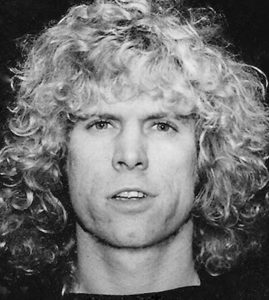 Tales of the Road Warriors!
Tales of the Road Warriors!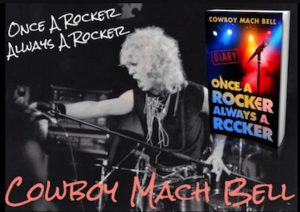
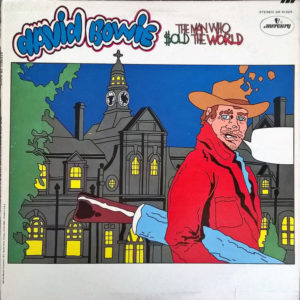 At some point, this odd looking cartoon on the cover of an album in the bin caught my eye. I picked up this odd looking album and began reading the lyrics to the songs – (in those days, it was common for the song lyrics to be printed on the back of an album jackets). I stood in the store poring over every word. This was some pretty dark stuff, but incredible lyrics, and decided I HAD to hear what the music sounded like. So, for 99 cents, I figured, what the Hell? So, I bought it and took it home.
At some point, this odd looking cartoon on the cover of an album in the bin caught my eye. I picked up this odd looking album and began reading the lyrics to the songs – (in those days, it was common for the song lyrics to be printed on the back of an album jackets). I stood in the store poring over every word. This was some pretty dark stuff, but incredible lyrics, and decided I HAD to hear what the music sounded like. So, for 99 cents, I figured, what the Hell? So, I bought it and took it home.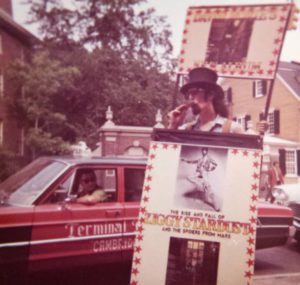 One day, I was doing my sandwich man thing… just strolling up the street, sporting my black top hat, ponytail, playing my harmonica and occasionally tooting the bicycle horn, when, a straight-looking guy in a suit approached me. In fact, in those days, we literally referred to guys like that as “suits”. So, this “suit” asked me if he could rent my entire sandwich sign, front and back, for two weeks. He went on to explain that he worked for RCA Records and they had just acquired a new artist from Mercury, and would it be cool to advertise his upcoming new album this way?
One day, I was doing my sandwich man thing… just strolling up the street, sporting my black top hat, ponytail, playing my harmonica and occasionally tooting the bicycle horn, when, a straight-looking guy in a suit approached me. In fact, in those days, we literally referred to guys like that as “suits”. So, this “suit” asked me if he could rent my entire sandwich sign, front and back, for two weeks. He went on to explain that he worked for RCA Records and they had just acquired a new artist from Mercury, and would it be cool to advertise his upcoming new album this way?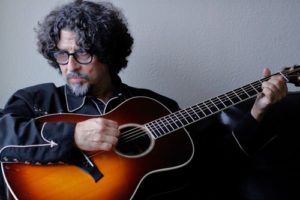
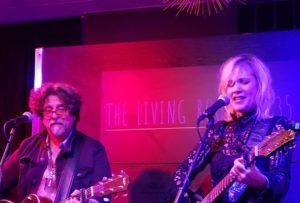 A few nights before this conversation this took place, I attended a Dan Navarro show at a tiny listening room in Ardmore, PA. The owner, Laura Mann is a singer songwriter, herself and has co-written some songs with Dan. So when he comes to town, he’ll usually do a show there.
A few nights before this conversation this took place, I attended a Dan Navarro show at a tiny listening room in Ardmore, PA. The owner, Laura Mann is a singer songwriter, herself and has co-written some songs with Dan. So when he comes to town, he’ll usually do a show there. In Part 1 of my conversation with Steve Schalchlin, we talked about Steve’s Texas roots; growing up gay, as the son of Baptist, and eventually finding his place as a musician, singer/songwriter and eventually landing the role of West Coast Director of the National Academy of Songwriters in Los Angeles, CA. Later, after being diagnosed with AIDS, he turned his prestigious position over to his protege, Brett Perkins, and pretty much resigns himself to die as a result of being HIV positive in the 80’s with no cure in sight.
In Part 1 of my conversation with Steve Schalchlin, we talked about Steve’s Texas roots; growing up gay, as the son of Baptist, and eventually finding his place as a musician, singer/songwriter and eventually landing the role of West Coast Director of the National Academy of Songwriters in Los Angeles, CA. Later, after being diagnosed with AIDS, he turned his prestigious position over to his protege, Brett Perkins, and pretty much resigns himself to die as a result of being HIV positive in the 80’s with no cure in sight.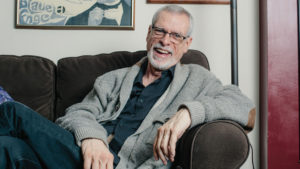 Steve Schalchlin is a singer/songwriter, a playwright, composer, a survivor of one of the worst epidemics to hit mankind since the plague… I’m talking about AIDS.
Steve Schalchlin is a singer/songwriter, a playwright, composer, a survivor of one of the worst epidemics to hit mankind since the plague… I’m talking about AIDS.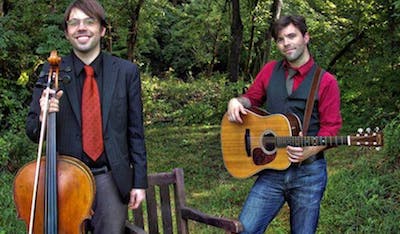

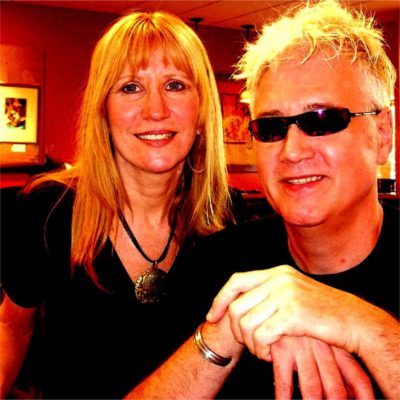

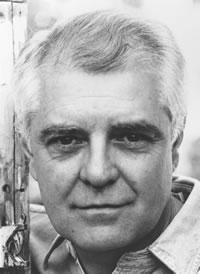 Where to begin? There are singer/songwriters, there are philosophers, there are humorists, there are entertainers and then are freelance human beings. The powers that be have been trying to define James Lee Stanley for years. Think – Will Rogers but with a guitar. I’m not going to go into a long introduction here, but briefly, here’s what you should know…
Where to begin? There are singer/songwriters, there are philosophers, there are humorists, there are entertainers and then are freelance human beings. The powers that be have been trying to define James Lee Stanley for years. Think – Will Rogers but with a guitar. I’m not going to go into a long introduction here, but briefly, here’s what you should know…








